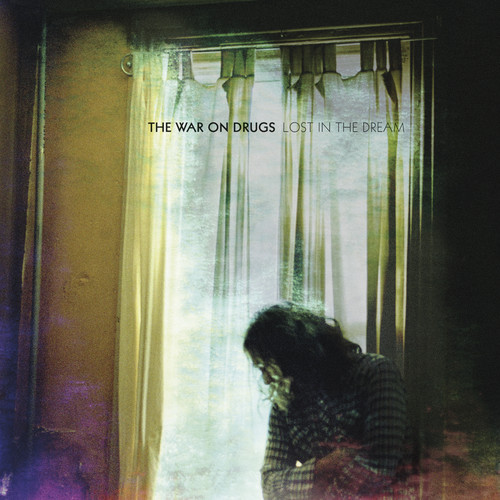A glance at the cover of Lost In The Dream might suggest something has changed since the last The War On Drugs record – 2011’s Slave Ambient. For the first time we see Adam Granduciel portrayed on the cover of his record, looking tentatively towards the world through a veiled window. Whilst this might be interpreted in different ways – perhaps a nod to his adored heroes, Dylan or Springsteen – the true answer lies within the story of the record.
Development has always featured highly on The War On Drugs agenda – Granduciel has often spoken of his desire to keep the project moving forwards. Technically – through their use of tape loops and soundscaping – The War On Drugs have brought fresh innovations to a genre often focused on a more traditional approach. Incorporating elements of shoegaze and electronica, Slave Ambient carved out it’s own vision of Americana’s future, to great acclaim. While demonstrating through his past work just how forward-thinking he has become as a producer and musician, where Granduciel has developed most, with Lost In The Dream, is as an artist.
Through these ten songs, a portrait is painted that comes into focus, clearer than it ever has before with The War On Drugs. You can hear the ambience of New Jersey and its rich musical heritage reverberating through leading track ‘Red Eyes’. Springsteen has laid the foundations and The War On Drugs – alongside the likes of Titus Andronicus – are building a lasting monument to the state. You could imagine driving down the coastal roads to Atlantic City and beyond with ‘An Ocean Between The Waves’ – a progressive track, where the vocals fade into the middle distance, lost as it comes to a hook laden, agitated end. The Dylan-esque obsessions that powered the formation of The War On Drugs have never been so expressly conveyed as they are on ‘Eyes To The Wind’ – a sentimental reflection, based around returning home and how that can bring into focus just how much has changed about you. In the midst of it all, you can imagine a strung-out Granduciel, penning the lyrics to the title track ‘Lost In The Dream’ on a napkin in a Philadelphia diner, trying to make sense of things. The rough sketches of Granduciel’s lyrics leave enough space for the imagination to run away with them. The sentimental tone of these songs, strike an inspirational chord, succinctly.
A second glance at the album cover and what is revealed is a much more human The War On Drugs – autobiographical and relatable. This time round, their songs are designed to connect in a more meaningful way. These are anthems for boozy sing-alongs; songs to find comfort in, after a difficult day; muses to sweep you off your feet. Adam Granduciel’s songwriting is reaching out to his audience more than ever.
The level of finite attention that has gone into Lost In The Dream is remarkable. The album was recorded and produced over a period of two years at studios across four states, on the east coast of the United States. As a record, it bares the scars of this effort, whilst delivering a concisely produced end product. When a band spends three weeks at a remote studio recording an album, this is a piece of work. When a band spends two years shaping a record, it’s an obsession – and in this case, a refined and emotional obsession.
Much has been made of the on/off working relationship between Adam Granduciel and Kurt Vile. With speculation over fall-outs reported and subsequently clarified not to be the case, the pair remain best friends, despite deciding to travel their own – albeit intertwined – musical journeys. On the evidence of the musical output here and from Vile’s own work, the only conclusion is that there are simply too many worthwhile ideas coming from the two, than could ever be realised by one band. They are both ideas men, leaders within their field – and besides, there is only space for one artist on the album cover of such a personal record, as Lost In The Dream is.
Aside from when major labels do it to help the sales of their recognisable client’s records, there is only one reason I can see, an artist would decide to put themselves on the cover of their album – because they’re utterly proud of what they’ve made. And so he should be. With Lost In The Dream and his band The War On Drugs, Adam Granduciel has made an incredibly strong case that his heroes should now be considered his peers.


